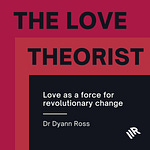In this podcast I want to share with you another dimension of my evolving theory of love which seeks to guide us in how to respond to peoples’ experiences of broken-heartedness. I proceed by sharing some ideas from Peter Marris’s 1974 book - Loss and change. His main argument is that the meaning we make of loss deeply affects how we negotiate bereavement. He suggests that for some of us we might not be able to make sense of what has happened to the extent our own ability to keep going is compromised. Marris refers to loss and change in our personal relationships and also in our community and the world. The meaning making process we each undertake is influenced by socio-cultural factors as well as our own life experiences, including how secure we feel in our relationships (attachments) with others.
I find these ideas help me understand why some types of loss - eg. where there has been unfairness and/or violence - cause deep wounds in our hearts. Further, our personal experiences of unfairness and how we try to grieve and address that treatment can be compounded by our awareness of, or direct involvement in, social issues and events where there is unfairness and violence. For individuals, whole groups and communities where injustice is rife, there can be a collapse of ability to make meaning of what is happening, sufficient to maintain hope and a sense of fairness being possible. An implication is that seeking to understand the meaning people attribute to their experience can help us be more relevant in how we might seek to support them. Additionally, where people are experiencing compounding loss and change their grief is likely to be complex and deepen into broken-heartedness.
Thank you for your interest, do let me know what you think of this post.
You can follow me on instagram - @drdyannross - and TikTok - @drdyannross. My book, Broken-heartedness, provides more details on the causes of broken-heartedness and how love practices can be drawn upon to address lovelessness.






Share this post